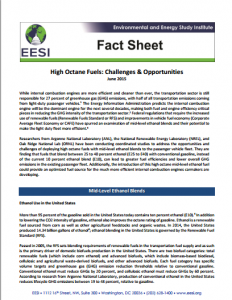Full Title: High Octane Fuels: Challenges & Opportunities
Author(s): Jessie Stolark, Katherine Lynn, and Carol Werner
Publisher(s): Environmental and Energy Study Institute
Publication Date: June 1, 2015
Full Text: Download Resource
Description (excerpt):
While internal combustion engines are more efficient and cleaner than ever, the transportation sector is still responsible for 27 percent of greenhouse gas (GHG) emissions, with half of all transportation emissions coming from light-duty passenger vehicles. The Energy Information Administration predicts the internal combustion engine will be the dominant engine for the next several decades, making both fuel and engine efficiency critical pieces in reducing the GHG intensity of the transportation sector. Federal regulations that require the increased use of renewable fuels (Renewable Fuels Standard or RFS) and improvements in vehicle fuel economy (Corporate Average Fleet Economy or CAFE) have spurred an examination of mid-level ethanol blends and their potential to make the light duty fleet more efficient. Researchers from Argonne National Laboratory (ANL), the National Renewable Energy Laboratory (NREL), and Oak Ridge National Lab (ORNL) have been conducting coordinated studies to address the opportunities and challenges of deploying high octane fuels with mid-level ethanol blends to the passenger vehicle fleet. They are finding that fuels that blend between 25 to 40 percent ethanol (E25 to E40) with conventional gasoline, instead of the current 10 percent ethanol blend (E10), can lead to greater fuel efficiencies and lower overall GHG emissions in the existing passenger fleet. Additionally, the introduction of this high octane mid-level ethanol fuel could provide an optimized fuel source for the much more efficient internal combustion engines carmakers are developing.
